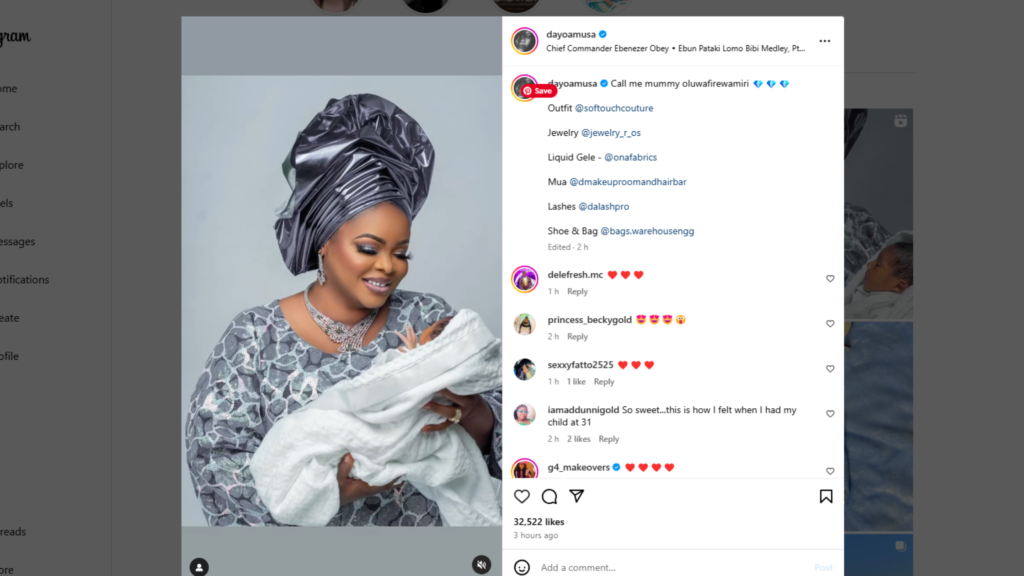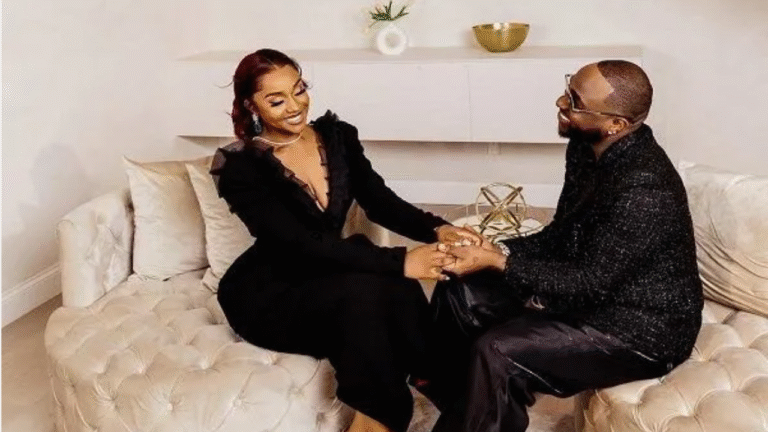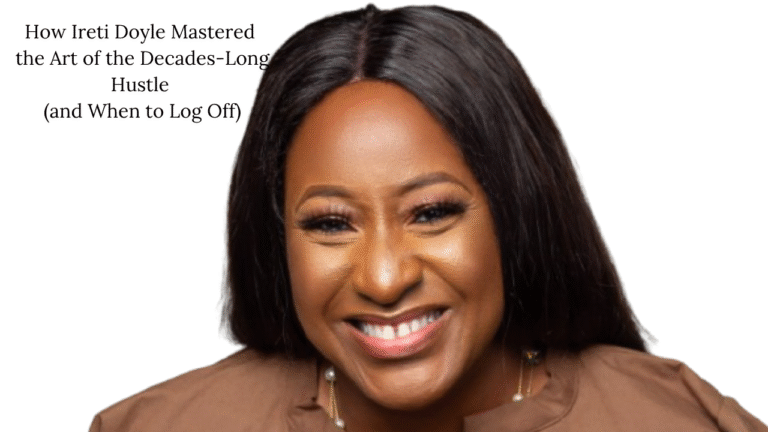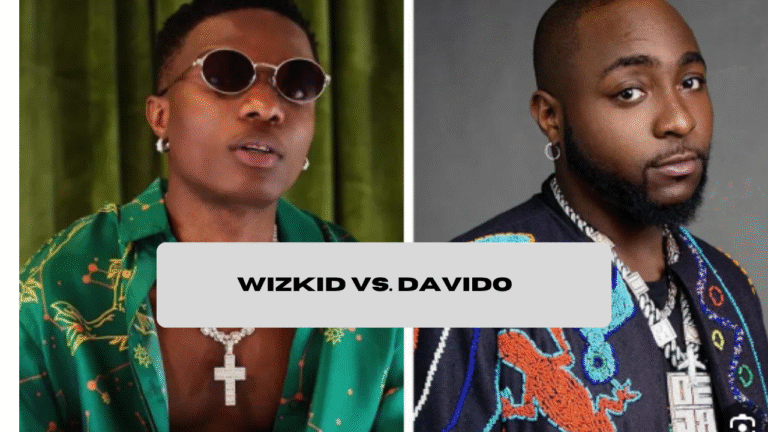
Nollywood actress Dayo Amusa recently found herself at the centre of a social media storm, not for her on-screen performances, but for her personal life. After welcoming her first child, Amusa faced a barrage of inquiries about the identity of her child’s father. Her response, bold and unapologetic, has sparked a conversation about the boundaries between celebrities and their fans in the digital age.
Amusa’s experience is a stark reminder of the intense scrutiny celebrities face in today’s hyper-connected world. While fans have always been curious about the lives of their favourite stars, social media has amplified this curiosity to unprecedented levels. Platforms like Twitter, Instagram, and TikTok provide a constant stream of information, and sometimes misinformation, about celebrities, blurring the lines between their public personas and private lives.
The sources depict how the public’s insatiable appetite for celebrity gossip led to relentless probing into Amusa’s personal life. Social media users and bloggers, driven by a desire for clicks and engagement, bombarded her with questions about the paternity of her child. This relentless pursuit of personal information highlights a concerning trend where some fans feel entitled to know every detail of a celebrity’s life, regardless of boundaries.
Amusa, however, refused to bow to this pressure. In a live TikTok session, she addressed the speculation head-on, asserting her right to privacy in no uncertain terms. “Is your husband missing?” she pointedly asked those who were so fixated on the identity of her child’s father. Her defiant response, laced with sarcasm and wit, was met with applause from many who saw it as a necessary pushback against an intrusive online culture.

This incident brings to light a fundamental tension in the celebrity-fan dynamic. While celebrities rely on public attention for their careers, they are also entitled to a private life, just like anyone else. The sources reveal how this tension plays out in the digital realm, where fans, empowered by social media, often overstep boundaries, demanding access to aspects of a celebrity’s life that are not theirs to know.
Amusa’s decision to shield the identity of her child’s father was framed as a way to protect her peace and happiness. This resonated with many who recognised the need for celebrities to maintain control over their personal narratives, especially when it comes to sensitive matters like family. The sources also acknowledge the economic incentives that drive some individuals to pry into the lives of celebrities. Amusa herself pointed out that some people capitalise on gossip and speculation to generate income through social media engagement.
The incident involving Amusa also exposes the darker side of online fandom. The sources reveal how some individuals went as far as to unearth an unrelated video of another actress discussing IVF, attempting to manufacture controversy and pit the two women against each other. This deliberate attempt to stir up drama for online engagement underscores the harmful consequences of a culture that prioritises clicks and views over respect and privacy.
The framing of Amusa’s response in the sources is significant. Words like “replies”, “blasted”, and “applauded” are used to describe her reaction, portraying her as a strong, defiant figure standing up to online bullies. This portrayal is likely to shape public perception, painting Amusa as a champion for celebrity privacy in a world where personal boundaries are increasingly blurred.
Amusa’s experience serves as a wake-up call, reminding us that celebrities are not simply characters in our entertainment but individuals with their own lives, families, and vulnerabilities. It’s a call for a more respectful and empathetic online culture, one that recognizes the right of public figures to privacy and allows them to control their own narratives. The digital age has brought us closer to celebrities than ever before, but this proximity should not come at the expense of their well-being or their right to a private life.
Societal Attitudes and Celebrity Privacy: Dayo Amusa’s Response

Dayo Amusa’s response to inquiries about the father of her child reflects broader societal attitudes towards celebrity privacy. While there is a fascination with the personal lives of celebrities, there is also a growing recognition of their right to privacy.
- The sources describe how social media users and bloggers showed a strong interest in the identity of Amusa’s child’s father. This highlights society’s interest in the private lives of celebrities, often fueled by gossip and speculation.
- The sources also reveal that some individuals dug up a video of another actress, Opeyemi Aiyeola, discussing IVF to stir up controversy and generate social media engagement. This demonstrates how the desire for online attention can lead to the invasion of privacy and the spread of misinformation.
- Amusa’s forceful response, questioning why people were so interested in her personal life and asserting her right to privacy, was applauded by many. This suggests a shift in public opinion, with more people recognizing the boundaries that should be respected when it comes to the private lives of celebrities.
- Amusa’s decision to keep her child’s father’s identity private was framed as a way to protect her peace and happiness. This resonates with the idea that celebrities, like anyone else, deserve to have control over their personal lives and protect their well-being.
- The articles also highlight the financial incentives driving some individuals to pry into the lives of celebrities. Amusa acknowledges that some people rely on gossip and speculation about celebrities to generate income through social media engagement. This illustrates the complex interplay between societal curiosity, the media, and the economic forces that can lead to intrusions into celebrities’ private lives.
Celebrity Pushback Against Intrusive Online Audiences
This incident reveals a common dynamic between celebrities and their online audience, where audiences feel entitled to information about a celebrity’s personal life and celebrities push back against these intrusions.
- Dayo Amusa, a Nollywood actress, has recently received public inquiries about the identity of her child’s father. Amusa responded to the questions during a live TikTok session.
- She explained that she keeps her child’s father’s identity private because she wants “to maintain [her] peace” and prevent anyone from ruining her happiness.
- Amusa sarcastically questioned why people were so interested, asking, “Is your husband missing?”. She said that her child “definitely has a father” but that she is the one in the public eye, not her husband.
- She also pushed back against the idea that she owes the public any information, stating that she will “only let out what [she wants] to let out”. She said she won’t let people “pour sand into [her] cassava flakes”.
- Fans largely applauded Amusa’s response in the comments section. One commenter said they loved Amusa’s reply because “people [are] like a person they want to see finish”. Another commenter told Amusa to ignore the commenters, describing them as “busybodies”. A third commenter agreed, saying that “People love gossip that doesn’t concern them”.
- One commenter suggested that Amusa’s own fans were not the ones asking, stating, “Na ur people dey use fake account ask ooo, no be we fans oo”. This suggests that the commenter believes the questions were coming from people seeking to harm Amusa’s reputation, not genuine fans.
- Amusa suggested that the questions were motivated by a desire for “social media validation” and encouraged those asking to “cook up [their] lies, make [their] money, and feed [their] family”.
- The Premium Times described the commenters as “critics and trolls”. It also said that Amusa has been the target of negative media attention in the past. This suggests that the questions about her child’s father are part of a larger pattern of scrutiny and negativity directed at Amusa.
This incident suggests that some fans believe they are entitled to know intimate details of a celebrity’s personal life. While fans may feel connected to the celebrities they follow, celebrities often push back against these intrusions, asserting their right to privacy. The incident also shows how social media can create an environment where celebrities are subject to constant scrutiny and negative attention, even from those who claim to be fans.
In conclusion, Dayo Amusa’s response to the public’s curiosity about her child’s father reflects a broader societal tension between the fascination with celebrity lives and the increasing recognition of their right to privacy. While there are still those who seek to profit from invading celebrities’ personal space, there is also a growing understanding and respect for the need to allow them to maintain boundaries and control their own narratives.







4 thoughts on “When Fans Cross the Line: Dayo Amusa and the Right to Privacy in the Age of Social Media”